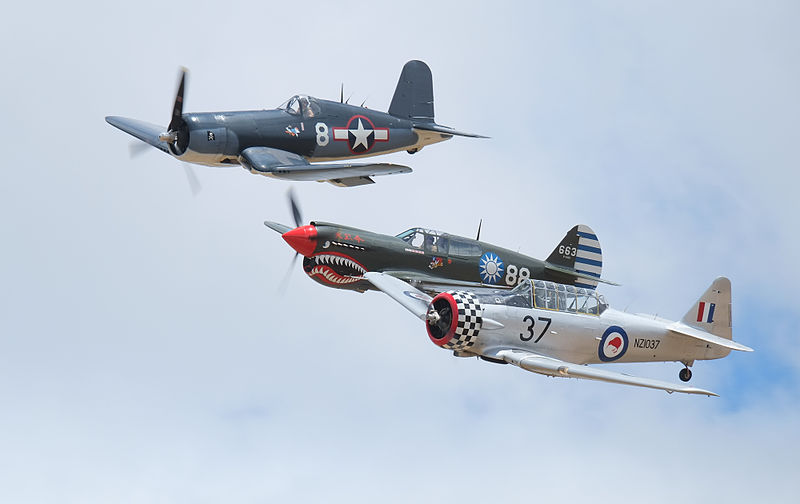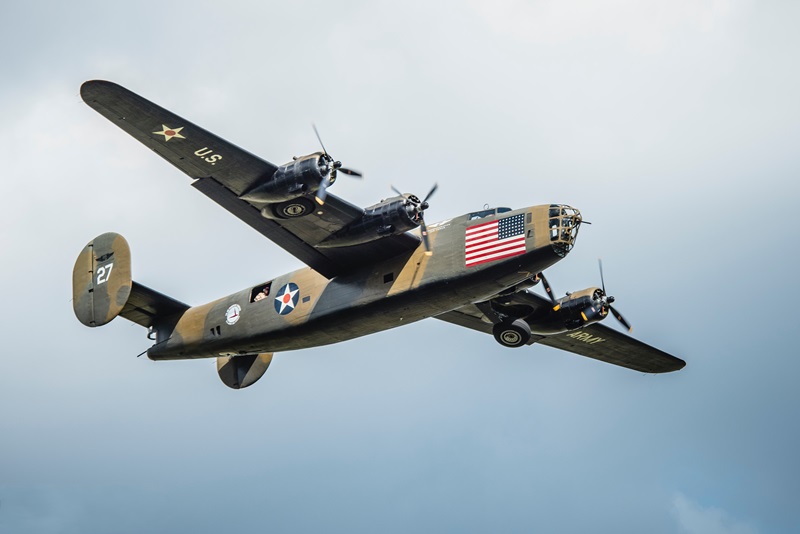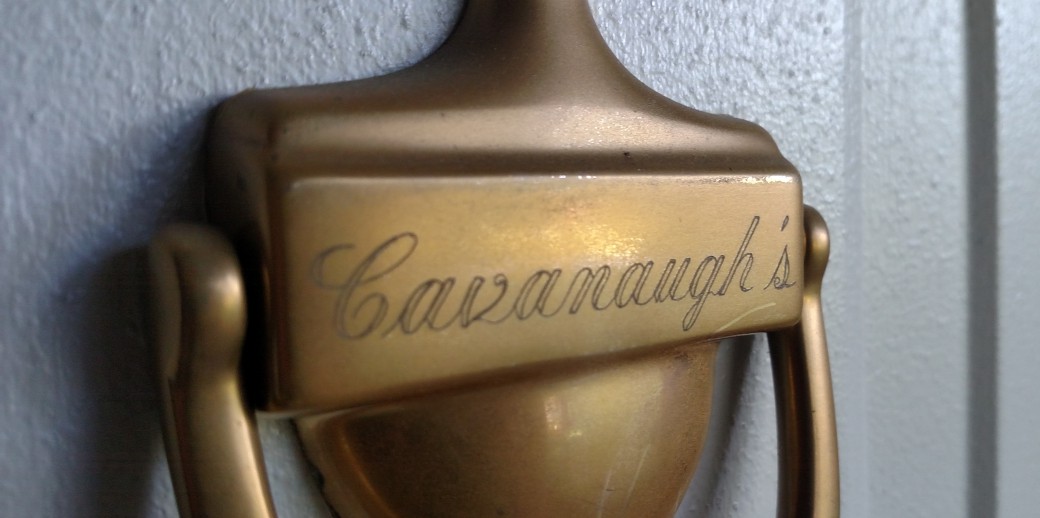What Is In A Sound?

This past weekend I got to experience a thrill. It was a rarely seen sight – three fighter planes flying in formation over my little corner of the midwestern suburbs. That these three fighter planes were of the kind that would have last seen action in the 1940s was what made the scene such a treat. But more than the sight was the sound.
I am a motorhead. I love mechanical things. More than anything, I love the sound of an engine. Different engines have different sounds and for those of us who notice this kind of thing, some of those sounds are a treat.
A modern car with a four or a V6 engine is a normal sound. Some of them sound a little different than others do, but they still make sounds that are more or less background noise, even for someone like me.
But an older V8 or certain older inline six engines are simply music to my ears. These were background sounds when I was growing up, and in those years I soaked them up almost unconsciously. Now those sounds light up certain areas of my brain and make me happy.
The sound of a piston-engine aircraft does the same thing for me. The jet engine was well on the way to dominance in the years of my childhood but I can still remember the sound of multiple massive piston engines powering an airplane through the sky.

I can recall the thrill from a few years ago when a B-24 Liberator was in town for an air show. The B-24 was a four-engine bomber from World War II. Those things suck fuel at such a rate that the only way it is possible for one to be kept airworthy is for it to somehow earn its keep on the show circuit, which involves selling rides.
I still recall the day I stood in the parking lot of my office and watched that plane slowly lumbering through the air, all four of those giant radial engines making what some would have considered a racket but which I considered as fine music – music that sent a thrill all the way through my bones. When I later found out that this was one of only two of this model that remain airworthy, the thrill went even deeper.
I experienced the same thrill as these three fighters flew in big, lazy circles. Every time they would come back my way I would hear the engines getting louder before their sound would drop to a lower note as they passed. I have been told that this is the Doppler Effect, that the sound waves from an approaching airplane are different from those that come from a plane as it flies away.
I went into a store to do some shopping and was delighted to hear those planes yet again as they flew over the building. This time they added an element of surprise to the experienced as I could not see them coming. It was then that something struck me: This sound, one that I awaited eagerly and thrilled to as it passed overhead would once have been a sound as terrifying as any ever made to huge numbers of peoples all over the world.
The people of England, Europe, Hawaii, Islands of the Pacific, and those on vessels on the ocean would once have lived in fear and dread when that sound became audible. As one living in the middle of the US during a time of uninterrupted peace, I cannot begin to imagine the emotions that would come from that sound during a time of war. Would the planes pass harmlessly by? Or would there be deadly and destructive bomb blasts or machine gun fire to accompany them?
I don’t really have a point to this but to consider how a sound can be all about its context. This being the week of Independence Day in the US, we can all enjoy the sound of fireworks both big and small as being part of a celebration. Who doesn’t love a good fireworks show? But for some those are also the sounds of death and destruction in places where gun shots and bomb blasts have upset the kind of normal life everyone wants to live.
In a way they are both the same thing. Fireworks are meant to signify long-ago military battles that brought plenty of terror in their own day. Warplanes did the same thing, only more recently. In both cases, however, enough time has passed that the sounds of exploding gunpowder and obsolete armed aircraft are more associated with good things than with bad.
It would be naive to hope that the sounds associated with modern warfare could soon be transformed in the same way. The world is a dangerous place. The playground will always have bullies and the world will always have aggressors – essentially the same thing, but for a wildly different scale.
I guess this makes me appreciate the time and place where I live quite a lot, where I can enjoy the sound of old warplanes and fireworks as something fun. It is my sorrow that not everyone can enjoy the sounds that accompany these things. And my child-like hope that this will not always be so.
Photo credits:
Opening photo of F4U Corsair, P40 Warhawk and T6 Texan – Wikimedia Commons, Photo in the public domain.
B-24 Liberator Diamond Lil – Wikimedia Commons, Photo dated May 31, 2015 by R’elyh Photography

Very interesting and compelling observations. My grandfather, who is now 94 and of whom I speak often, was a mechanic in the Army Air Force stationed in Great Britain during the first part of WWII. He heard countless examples of these planes in their prime. While rarely mentioning American or English planes, he has often spoken of the unmistakable sound of German buzz bombs; these were the bombs that had a certain amount of fuel in their propulsion device and would fall to the ground with their bomb upon fuel being depleted. Many were directed at England. He said that was the worst sound he ever heard as everyone would stop to listen and plan an escape route. When it passed by, all activities would resume.
However, I did see him Monday of this week at his assisted living apartment. It seems there are 45 people who live there, 40 of whom have walkers. He stated the worst sound ever was the sound of 40 old people all grabbing their walkers at once after a meal – he said the banging and clanging is overpowering.
LikeLike
I have never heard a buzz bomb, and don’t think I would want to. I cannot imagine that those would adapt to recreational use in any way.
I guess it’s a positive that your grandfather’s hearing is good enough that the sound of the metal walkers is irritating.
LikeLike
My dad lived in London through the Blitz. He said people got used to the V1 “Buzz Bombs” quickly. They were loud and slow and there was almost always time to get shelter. It was the supersonic rocket-powered V2 that was scary … it would hit before you heard it.
LikeLike
Those V2s would indeed be scary!
LikeLike
There’s a scene in the 1954 movie “The Glenn Miller Story” where the band is playing an outdoor concert when air alerts sound and the weird sound of a German buzz bomb is heard approaching. Glenn and the audience nervously glance around and when the buzz bomb’s engine cuts out, the audience ducks for cover – but the band keeps playing. The nearby explosion occurs just as the band hits the music’s climatic ending.
There is a poor recording with intermittent motion on the net of this scene. The air raid sirens start at the 1:19 mark. When I saw this movie as a kid, the sound of that buzz bomb was quite loud and creepy. These type of blind and random attacks were common in England during WWII.
LikeLike
I have not seen that movie in decades, should watch it again. Yes, those uncontrolled buzz bombs were not unlike modern terrorism.
LikeLike
Lucky for me I live less than 10 miles away from an airplane museum. Many times during the summer I will hear the sound of a big radial engine on the weekend. I even scored a ride in their Stearman PT-17 for my 40th birthday.
But what I really love is the sound of the Avro Lancaster. This video has crummy visuals but a good audio.
I wonder how these would have sounded in wartime, now they take off unloaded and are basically loafing along, but in actual service they would have been clawing into the air with a full load, and straining for altitude and airspeed.
My mother remembers hearing them go over from her home in Holland, then a few hours later they would here them again on the way back from Germany.
LikeLike
I would love to get that serenade more frequently.
LikeLike
Love that sound! That thundering noise reminds me of hearing it live at air shows either at YHM or on the Lakeshore in Toronto. Did you take that video Doug? Nicely done! I also enjoy the throaty sound of a performance car driving by. A sound that was once ubiquitous, and is now rare.
My favourite aircraft sound ever was when an SR-71 flew over my house, incoming for the CIAS. I felt the ground shake as it was on landing approach perhaps 2500 feet up or so.
LikeLiked by 1 person
No, I didn’t take the video. In situations like that I’m much more likely to just enjoy the experience rather than go for the camera.
Cool, I never saw an SR-71 in flight but I did see a Concorde flying once in England. I was the only person on the street gawking.. 🙂
LikeLike
We used to live near Moffet Field in California when it was used by the Navy as a base for Pacific Ocean anti-submarine patrols by turboprop P3 Lockheed Orion’s, well into the ‘90’s. At some point the sound of the planes became just noise. But when the airfield was used by visiting B24’s and B17’s, the distinct sound of the piston engine vs turboprop was quite pleasing to me. As was the sound of a loud V8 accelerating a few blocks from my house, about 5AM today. I lay awake for a few minutes wondering if it was a Detroit product, or an Audi, BMW or Mercedes V8. The last 20 years have indeed changed the automotive soundscape.
LikeLike
Sure has. And a turboprop does nothing for me.
LikeLike
“… a turboprop does nothing for me.”
Generally I agree. However, there are two aircraft – well maybe just one left now – whose twin turboprops make an other-worldly sound when flying over head. These two were the Beech Starship and the Piaggio P.180 Avanti. Only a few Starships still exist in the wild but the P.180 is in regular service here and there and used by people who have a flair for the unusual. I believe one flies out of Morristown Airport and I always try to catch a view of it when I hear its unique sound overhead.
These are turboprop pusher designs, and the mixture of the spinning props in the jet engine’s powerful exhaust combined along with the split wind flow coming off the wings makes for a high pitched howling whine which, while not actually louder than most turboprops, seems noisier and has garnered its share of local complaints.
Here’s a video of a P.180 making two low high speed passes. Even the dog was upset!
LikeLiked by 1 person
Just playing this on the computer got my dogs upset LOL! Very high pitch sound. Without double checking, the initial impression of this whine is similar to that of a P-51 Mustang.
LikeLike
When there is a B17, or more rarely a B24, in town it usually flies over our house at least a couple of times. I always drop everything and run out to get a look and listen. The B17 flies over kind of low and slow, but still the ground shakes as it passes. Occasionally a flight of 4 or 5 blue and yellow biplanes goes over, also making an impressive sound. My first boss had been a mechanic in the Air Corps and talked of thousand-plane raids in Europe. Can you imagine the sounds?
LikeLike
Wow, I cannot begin to imagine the sound of 1,000 of them.
LikeLike
For quite a few years my little local airport has been the home of a couple of Stearman biplanes and a WWII trainer, all with that lovely distinctive radial engine sound. It occurs to me that I haven’t heard any of them this summer, will have to head over there and see if they are still around.
In the early ’90s there was still somebody flying cargo out of Lansing MI on a regular basis in a DC-3. When the wind was right, their outbound path would take it right over downtown.
LikeLike
I hope those planes are still around for you. I looked it up and these were in for a show and were offering rides, so an uncommon occurrence here.
LikeLike
I’m close to 70 yr. Old . I loved to hear an approching radial eng. Plane. I’ve done mechanical work most of my life. I just wanted to tell you I Know exactly what you mean when you say music to your ears when u hear engine sounds.nice to know there’s people that share to same interests thank you!
LikeLike